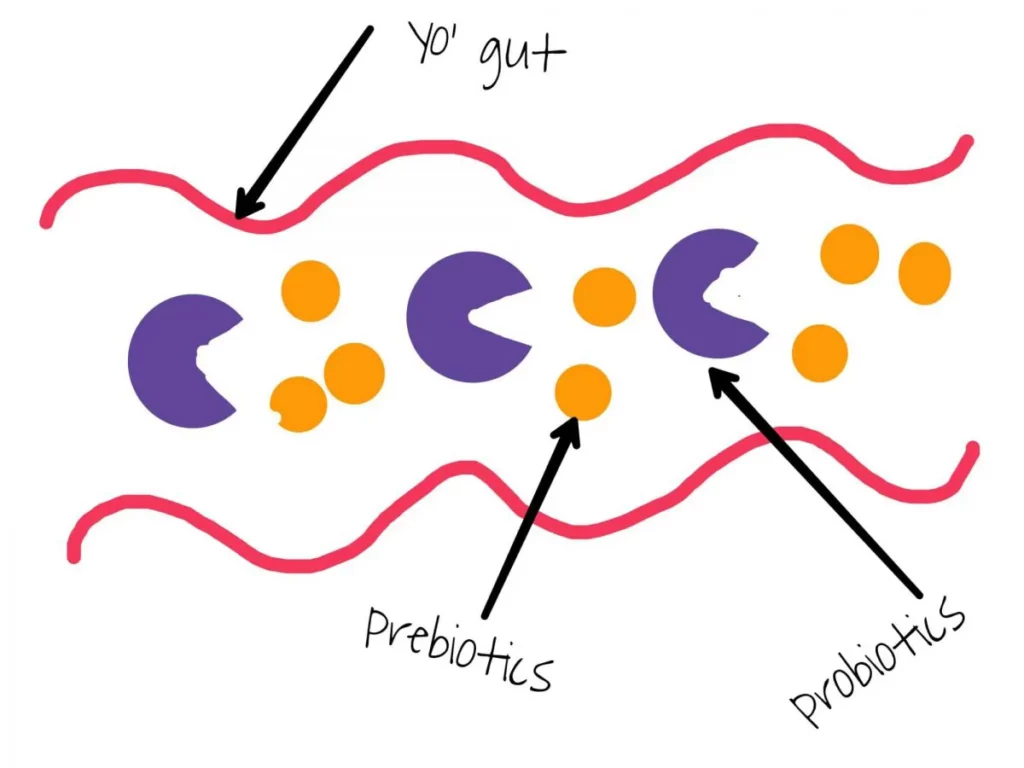Trillions of microscopic organisms—or microbes—call your body home. In fact, about 95 percent of those microbes live in your gut. This is where the name “gut microbiome” (or “microbiome” for short) comes from. It refers to the place in your gut where all of these essential microbes (bacteria, viruses, and fungi, etc) reside.
Scientists are actively studying the relationship between our gut microbiome and our health. Many people don’t realize a healthy gut does far more than handle digestion. Research into the gut microbiome is revealing startling results, showing its effects on the immune system, obesity, allergies, and even our emotional health.
Everything we do—what we eat, the air we breathe, substances we put on our body, the antibiotics and supplements we take—affects our microbiome in a unique way. It’s up to us to create the healthiest microbiome for ourselves.
Each of our microbiomes, especially the gut microbiota, is as unique as our fingerprints. It houses nearly 100 trillion bacteria that outnumber our human cells by a factor of 10 to 1. Most of these bacteria are probiotics, the good bacteria that serve a beneficial purpose —they can help your body produce vitamins, absorb nutrients from your food, and even help regulate your mood. Probiotic bacteria can also serve as placeholders, taking up room by colonizing within your digestive tract so that other bacteria can’t settle in, multiply, and create chaos for your system.

Prebiotics are the natural dietary fibre that nourishes our probiotic bacteria. While probiotics introduce good bacteria into the gut, prebiotics act as a fertilizer for the good bacteria that’s already there. They help your good bacteria grow, improving the good-to-bad bacteria ratio. This ratio has been shown to have a direct correlation to your health and overall wellbeing, from your stomach to your brain.
Now that you understand the importance of a healthy microbiome, here comes the challenge. Our industrialized, modern culture isn’t very conducive to maintaining a one. A study published in April of 2015 in Science Advances found the highest human microbiome diversity ever seen was in an isolated Yanomami tribe that had no contact with the industrialized world, which shows how life after the Industrial Revolution is changing the foundation of our health.
Instead of eating fermented and whole foods with healthy prebiotics and spending time outdoors (naturally repopulating our digestive tracts), many of us eat a diet high in processed foods, spend time indoors at home or at work, and live a high-stress lifestyle. Even if we don’t take antibiotics while we’re sick, both antibiotics and antimicrobials are often unavoidable as they’re present in our food and in our water.
We are only beginning to understand the long-term impact that these cultural habits have on our health. The good news is that your microbiome is malleable, meaning that you can improve your gut health with a few simple changes in your daily routine.
Cut Out Food Toxins

Get rid of sugar, refined carbohydrates and processed foods from your kitchen. This should be your number one priority. The gut simply cannot function at it’s best if you continue to eat them.
The sweet stuff promotes the growth of bad bacteria in the gut, hampering the growth of the beneficial kind. Diets high in sugar, refined carbohydrates, and processed foods basically provide an all-you-can-eat buffet for the bad bacteria to thrive.
Up Your Probiotics Intake
When it comes to giving your gut a helping hand, probiotics are the best place to start. Probiotics help to restore symbiosis (balance) to your microbiome, which helps keep your body healthy.

You can start by incorporating natural probiotic foods into your diet. Plain yogurt (dahi) is a great source of probiotics. South Indian staples such as Idlis and Dosas that are by fermenting rice and urad daal, which makes them a rich source of live cultures of good bacteria. Homemade Pickles (achar) made from vegetables and fruits mixed with sugar, salt, herbs and oil that are allowed to ferment under the sun favours the growth of good bacteria. Dhokla, the Gujarati delicacy made using fermented besan and curd is also rich in probiotics.
As you can see fermented provide plenty of probiotics. And you can ferment just about anything! Some classic international staples include sauerkraut, kombucha, kimchi, and strong, aged cheese. These are just a few examples of probiotic-rich foods that will easily absorb into your body, giving you the maximum benefits from the beneficial bacteria where you need them most.
Introduce Prebiotics into Your Life
Live probiotic bacteria are easy to find and consume but where can you find prebiotic fibre?
Prebiotic fiber is found in many fruits and vegetables, such as the skin of apples, bananas, onions and garlic, chicory root, and beans. Unfortunately, the miniscule amounts of fibre in each of these foods — such as 1 to 2 grams per serving — make ingesting enough fibre extremely difficult. Most people should consume at least 25 grams of fibre every day, and the foods highest in prebiotic fibre — chicory root is one such example — are nearly impossible to eat in large quantities every day.
The good news is that adding a prebiotic fibre supplement to your diet is fast and simple. In supplement form, prebiotic fiber is also mild in texture and nearly tasteless, making it easy to add to water, cereal or any other food. Simply sprinkle it on your foods or in your favorite drinks to enjoy the many benefits.
QNet’s Nutriplus Fibrefit is extracted directly from the Gum Arabic, a powerful prebiotic. Extracted from the Acacia Arabica tree, known in India as Babul. In Ayurvedic medicine, Gum Arabic has been used for centuries to treat constipation, diarrhoea, and boosting immunity. New scientific research has shown that Gum Arabic comprises as much as 85% Prebiotics.
The best way is to consume FibreFit is by dissolving it in water. But you can also add it to other drinks without changing its taste or odour.
The health of our gut is closely tied to many other bodily functions. Learning just a little about how you can strengthen your microbiome and taking the time to implement that knowledge can make all the difference for you and your family in the long run.
If you love your gut, it’ll love you back!
Related








